_________________________________________________
Update From Pollitecon Publications
July 2020
_________________________________________________
Sign
up to receive Updates
Below are some of the numerous additions to the Pollitecon website
over the past few months.
Free Ebooks
There are 13 new books, reports and papers in Pollitecon's Free
Ebooks Library.
On The Macedonian Identity
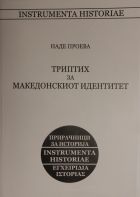 The
paper Triptych On The Macedonian Identity by Professor Nade Proeva is
sub-titled Views on Macedonian Self-Awareness from the Middle to the
Modern Age. The paper looks at the denial of the Macedonian Identity,
and includes numerous historical documents from 1690 through to the
modern era that refer to Macedonia and Macedonians. The author refutes
Bulgarian propaganda that Macedonians are Bulgarians. An example "is
the so called Kresna Uprising of 1878, which Bulgarian historians named
after the locality (centre of the uprising), in aim to avoid the name
Macedonia... However, the lead seal that survived, clearly bears the
inscription "makedonsko vostanie 1878" (Macedonian uprising 1878) and
the rules set by the Macedonian Uprising Committee constantly use the
terms ‘Macedonian uprising,' ‘Macedonian army', and the ‘Liberation
of the Macedonians', clearly indicating that the uprising, as well as
other subsequent "Bulgarian" uprisings, were organized by Macedonians
and not by Bulgarians!" The paper also discusses modern national myths
in Europe, particularly those of the Greeks, Bulgarians, Albanians and
Serbians. The paper is Here.
The
paper Triptych On The Macedonian Identity by Professor Nade Proeva is
sub-titled Views on Macedonian Self-Awareness from the Middle to the
Modern Age. The paper looks at the denial of the Macedonian Identity,
and includes numerous historical documents from 1690 through to the
modern era that refer to Macedonia and Macedonians. The author refutes
Bulgarian propaganda that Macedonians are Bulgarians. An example "is
the so called Kresna Uprising of 1878, which Bulgarian historians named
after the locality (centre of the uprising), in aim to avoid the name
Macedonia... However, the lead seal that survived, clearly bears the
inscription "makedonsko vostanie 1878" (Macedonian uprising 1878) and
the rules set by the Macedonian Uprising Committee constantly use the
terms ‘Macedonian uprising,' ‘Macedonian army', and the ‘Liberation
of the Macedonians', clearly indicating that the uprising, as well as
other subsequent "Bulgarian" uprisings, were organized by Macedonians
and not by Bulgarians!" The paper also discusses modern national myths
in Europe, particularly those of the Greeks, Bulgarians, Albanians and
Serbians. The paper is Here.
Lack of Media Pluralism in Greece
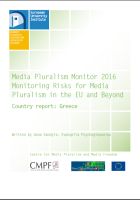 The
Greek Government's media policy lacks measures for community media and
access to media for minorities, and recommends that policy-makers give
attention to the access by minority populations to media platforms and
content, says a EU funded report by the Centre for Media Pluralism and
Media Freedom. The Media Pluralism Monitor 2016 - Monitoring Risks for
Media Pluralism in the EU and Beyond: Country Report: Greece makes four
conclusions about the Greek media in Greece. There is a clear need to
facilitate and strengthen media ownership scrutiny and transparency
to ensure that the Greek public knows who effectively owns the media.
Public disclosure of the ultimate owners of traditional and online media
should be required. Mechanisms are needed that protect and promote editorial
independence from political and commercial influence and owner interference.
State owed media should be insulated from Government interference. And
minority population should have access to media platforms and content.
The report, written by Anna Kandyla and Evangelia Psychogiopoulou, is
Here.
A Greek language version is Here.
The
Greek Government's media policy lacks measures for community media and
access to media for minorities, and recommends that policy-makers give
attention to the access by minority populations to media platforms and
content, says a EU funded report by the Centre for Media Pluralism and
Media Freedom. The Media Pluralism Monitor 2016 - Monitoring Risks for
Media Pluralism in the EU and Beyond: Country Report: Greece makes four
conclusions about the Greek media in Greece. There is a clear need to
facilitate and strengthen media ownership scrutiny and transparency
to ensure that the Greek public knows who effectively owns the media.
Public disclosure of the ultimate owners of traditional and online media
should be required. Mechanisms are needed that protect and promote editorial
independence from political and commercial influence and owner interference.
State owed media should be insulated from Government interference. And
minority population should have access to media platforms and content.
The report, written by Anna Kandyla and Evangelia Psychogiopoulou, is
Here.
A Greek language version is Here.
Report on the Human Rights Situation of the Macedonian Minority
in Bulgaria
The latest report on the situation of the Macedonians in Bulgaria says
"None of the rights stipulated in the Framework Convention on National
Minority Rights have been granted to the Macedonian minority. In schools
children do not learn anything about the Macedonian minority and nation;
on the contrary they are provided with information which not just omits
any mention of the Macedonian nation and minority, but also make its
bare existence look impossible. The Macedonian literary language continues
to not be taught. On television and in the media there is a continuous
and varied presentation of the view that there is no Macedonian nation
and that everything Macedonian is Bulgarian. The Macedonian point of
view is not included in lectures and discussions about history. Macedonian
consciousness itself ("Macedonianism" as it is labelled in Bulgaria)
is looked upon as an artificial anti-Bulgarian ideology." The Annual
Report on the Human Rights Situation of the Macedonian Minority in Bulgaria
and the Rights of Bulgarian Citizens with a Macedonian Consciousness
2019 is by the Committee for the Defence of Human Rights "Tolerantnost".
The Report is Here.
Four Human Rights Reports by Greek Helsinki Monitor
 The
Free Ebooks Library has added four reports on the lack of human rights
for Macedonians in Greece published by Greek Helsinki Monitor/ Minority
Rights Group - Greece. These are:
The
Free Ebooks Library has added four reports on the lack of human rights
for Macedonians in Greece published by Greek Helsinki Monitor/ Minority
Rights Group - Greece. These are:
- Greece:
Non-recognition of Macedonian & Turkish minorities despite ECtHR rulings
- Fulfillment
by Greece of its human rights obligations and commitments
- Parallel
Report on Greece's compliance with the International Covenant on Civil
and Political Rights
- Parallel
Report on Greece's compliance with the International Covenant on Economic,
Social and Cultural Rights.
The reports were co-authored with the Humanist Union of Greece (HUG),
and Coordinated Organizations and Communities for Roma Human Rights
in Greece (SOKADRE). The non-recognition report says "Greece, in defiance
of all international treaties, as well as several ECtHR judgments and
UN Treaty Bodies and Special Procedures' and Council of Europe institutions'
recommendations, refuses to even acknowledge any minority other than
what it calls "Muslim minority in Thrace." Ethnic Turks and ethnic Macedonians
cannot enjoy their rights when their associations are banned. Such impediments
on the contrary do not exist for ethnic Roma, ethnic Pomaks (and migrants)."
Guilty Without Guilt
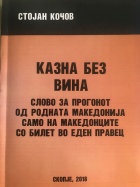 The
book Guilty Without Guilt is the English version of the book Bez Vina
Vinovni by Stojan Kochov. It is also a shortened version of 283 pages
as the original is over 1,800 pages. The book is about the huge role
played by Macedonians in the Greek Civil War, how these Macedonians
were controlled and manipulated by the Greek Communist Party and Western
Powers, and the tragedy of the child refugees. Mr Kochov was a fighter
in the war. He says "That is one reason why I have dedicated my entire
life to earnestly document all possible events that took place during
the Greek Civil War and tell our side of the story and the genocide
perpetrated against the Macedonian people in Greek occupied Macedonia."
He says the Macedonian people have endured, to a point of genocide,
in silence for over seventy years with no one to speak for them. The
book has a contribution by author Spiro Mavrovski. The book was translated
and edited by Risto Stefov. The English version is Here.
The short Macedonian version is Here.
The
book Guilty Without Guilt is the English version of the book Bez Vina
Vinovni by Stojan Kochov. It is also a shortened version of 283 pages
as the original is over 1,800 pages. The book is about the huge role
played by Macedonians in the Greek Civil War, how these Macedonians
were controlled and manipulated by the Greek Communist Party and Western
Powers, and the tragedy of the child refugees. Mr Kochov was a fighter
in the war. He says "That is one reason why I have dedicated my entire
life to earnestly document all possible events that took place during
the Greek Civil War and tell our side of the story and the genocide
perpetrated against the Macedonian people in Greek occupied Macedonia."
He says the Macedonian people have endured, to a point of genocide,
in silence for over seventy years with no one to speak for them. The
book has a contribution by author Spiro Mavrovski. The book was translated
and edited by Risto Stefov. The English version is Here.
The short Macedonian version is Here.
The Invention of the "Slavic" Fairytale
 In
his paper The Invention of the "Slavic" Fairytale, Macedonian academic
Basil Chulev heavily criticizes and ridicules the idea that slavic tribes
migrated to the Balkans and overtook the existing populations. "This
migration fairytale pertains that: "a tribe," which was unrecorded before
the 6th century, "appeared from behind the Carpathian Mountains" to
become the largest ethno-linguistic group in Europe "replacing all the
previous recorded populations." He says the "Slavic ethnic" identity
and its terminology were heavily politicized as they were used to support
outdated 19th century territorial ambitions. Among his numerous and
interesting evidence, he give examples of similarities between the Macedonian,
Thracian and Phrygian languages. Chulev says that from the time when
they were created, "Slavs" became subject to humiliation, discrimination
and persecutions by most of the regimes in Europe. He argues that migration
was from the south to north and not north to south. The paper is Here.
In
his paper The Invention of the "Slavic" Fairytale, Macedonian academic
Basil Chulev heavily criticizes and ridicules the idea that slavic tribes
migrated to the Balkans and overtook the existing populations. "This
migration fairytale pertains that: "a tribe," which was unrecorded before
the 6th century, "appeared from behind the Carpathian Mountains" to
become the largest ethno-linguistic group in Europe "replacing all the
previous recorded populations." He says the "Slavic ethnic" identity
and its terminology were heavily politicized as they were used to support
outdated 19th century territorial ambitions. Among his numerous and
interesting evidence, he give examples of similarities between the Macedonian,
Thracian and Phrygian languages. Chulev says that from the time when
they were created, "Slavs" became subject to humiliation, discrimination
and persecutions by most of the regimes in Europe. He argues that migration
was from the south to north and not north to south. The paper is Here.
In My Father's Village & Other Freedom Stories
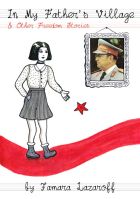 In
My Father's Village & Other Freedom Stories is a collection of 12 short
stories by Australian-Macedonian writer, Tamara Lazaroff. Her stories
and personal essays have been published in well known literary journals
and magazines in Australia, New Zealand and UK, and have won and been
short-listed in a number of writing competitions. The stories are about
hidden histories, being Macedonian, the migrant experience, queer and
feminist themes, oral storytelling traditions, and belonging and social
connectedness. The stories are well-written, easy to read, entertaining
and thoughtful. The book is Here.
In
My Father's Village & Other Freedom Stories is a collection of 12 short
stories by Australian-Macedonian writer, Tamara Lazaroff. Her stories
and personal essays have been published in well known literary journals
and magazines in Australia, New Zealand and UK, and have won and been
short-listed in a number of writing competitions. The stories are about
hidden histories, being Macedonian, the migrant experience, queer and
feminist themes, oral storytelling traditions, and belonging and social
connectedness. The stories are well-written, easy to read, entertaining
and thoughtful. The book is Here.
Prespa Postcard - Book on the Prespa Region
 Prespanka
Razglednitsa by Slave Katin is a major 442 page book about the Lake
Prespa region that covers Macedonia, Greece and Albania. The author
is a native of Prespa and the book is a collection of about 70 essays
and articles about his visits and experiences, the region's history,
geography, towns and villages, churches and monasteries, cultural events
and famous people. The discussions include the lakes and the upper and
lower Prespa regions, the development of Christianity in the area, the
Ilinden Uprising, and the child refugees and the exodus of many Macedonians.
There are many beautiful photographs. The book is in Macedonian. It
can be downloaded Here.
Prespanka
Razglednitsa by Slave Katin is a major 442 page book about the Lake
Prespa region that covers Macedonia, Greece and Albania. The author
is a native of Prespa and the book is a collection of about 70 essays
and articles about his visits and experiences, the region's history,
geography, towns and villages, churches and monasteries, cultural events
and famous people. The discussions include the lakes and the upper and
lower Prespa regions, the development of Christianity in the area, the
Ilinden Uprising, and the child refugees and the exodus of many Macedonians.
There are many beautiful photographs. The book is in Macedonian. It
can be downloaded Here.
Otsiron's Disappearance
Canadian-Macedonian author Risto Stefov has published a novel. The book
is titled The Alien that Changed the World: Otsiron's Disappearance.
Mr Stefov says that while it is a fictional story it has a Macedonian
twist. He hopes it will attract a general non-Macedonian audience who
are interested in the story and who will indirectly learn about the
Macedonian experience. The main character is a Macedonian who shares
his pain with others in similar situations. His family had come to Canada
from Greece so they could escape the Greek imposed torment and poverty
and get ahead in life. Otsiron's Disappearance also has a neat summary
of Macedonian oppression by Greece. "Well, besides my country being
occupied by foreign countries, the part of Macedonia I come from underwent
a lot of changes which were catastrophic for the Macedonian people.
The occupiers first changed our identity and declared that Macedonians
didn't exist. After that the occupiers changed our names and gave us
new names similar to their own. Then they changed the names of our cities,
towns, villages, lakes, rivers, mountains, etc., so that they too sounded
like their own. After that they forced us to learn the occupier's language
and forbade us from speaking Macedonian. And if that wasn't enough they
excluded us from progress. We couldn't attend higher education, we couldn't
rise up in the military or become members of professional organizations.
We weren't even allowed to build industries. In other words, there was
no bright future for the Macedonians in their own homeland. Our occupiers
wanted us to leave and that is exactly what most of us did." The book
is Here.
Part 2 of the novel - Otsiron's Return to Earth is Here.
Books by Other Publishers
The Macedonian Diaspora - Key to the Development of the Republic
of Macedonia
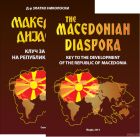 The
book The Macedonian Diaspora - Key to the Development of the Republic
of Macedonia by Dr Zlatko Nikoloski is printed in both English and Macedonian
in the one edition. Published in 2013, it is the first book to discuss
the importance and the potential of the Macedonian diaspora for the
development of the Republic of Macedonia. The book discusses the historical
aspects and the geographical distribution of the Macedonian people around
the world, the Macedonian diaspora and its role in strengthening the
relationship with Macedonia. It also examines the experiences of other
countries as examples of cooperation between diasporas and their country
of origin and how these can assist the relationship between the Macedonian
diaspora and the Republic of Macedonia. The 450 page book can be purchased
Here.
The
book The Macedonian Diaspora - Key to the Development of the Republic
of Macedonia by Dr Zlatko Nikoloski is printed in both English and Macedonian
in the one edition. Published in 2013, it is the first book to discuss
the importance and the potential of the Macedonian diaspora for the
development of the Republic of Macedonia. The book discusses the historical
aspects and the geographical distribution of the Macedonian people around
the world, the Macedonian diaspora and its role in strengthening the
relationship with Macedonia. It also examines the experiences of other
countries as examples of cooperation between diasporas and their country
of origin and how these can assist the relationship between the Macedonian
diaspora and the Republic of Macedonia. The 450 page book can be purchased
Here.
Stay Airbnb Home in Neret/ Polipotamos

Visiting Neret/ Polipotamos and the Lerinkso region is now easier as
there is an Airbnb house in Neret available to rent. The property was
developed by Perth businessman Jim Bivoltsis, who was born in the village.
The original stone house has been fully renovated with modern bedrooms,
kitchen, bathroom and laundry. It is one of the first houses as you
enter the village and is only a minute or two's walk to the centre of
the village, the main church and the two tavernas. It is on the side
of the hill with the river below and great forest views across to the
other side of the valley. There is wi-fi and offstreet parking for two
cars. There is more information Here.
Macedonia Needs Macedonians

Please remember that Macedonia Needs Macedonians. The Facebook page
for the Macedonia Needs Macedonians group is Here.
Two major tourism portals are Travel2Macedonia which is Here,
and Macedonia - Timeless which is Here.
Canadian Macedonian Books
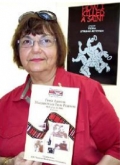 A
reminder that Canadian Macedonian Books has a great selection of Macedonian
books in English from around the world. These include non-fiction, fiction,
children's and cook books. Canadian Macedonian Books is run by Virginia
Evans, a former co-president of the Canadian Macedonian Historical Society
and founder of the Macedonian Film Festival in Toronto. Canadian Macedonian
Books is Here.
A
reminder that Canadian Macedonian Books has a great selection of Macedonian
books in English from around the world. These include non-fiction, fiction,
children's and cook books. Canadian Macedonian Books is run by Virginia
Evans, a former co-president of the Canadian Macedonian Historical Society
and founder of the Macedonian Film Festival in Toronto. Canadian Macedonian
Books is Here.
Sign
up to receive Pollitecon Updates
Thank you
Victor Bivell
Pollitecon Publications
PO Box 3411
Wareemba NSW 2046 Australia
Ph 02 9705 0578
Email vbivell @ pollitecon.com
Web http://www.pollitecon.com
More Updates

